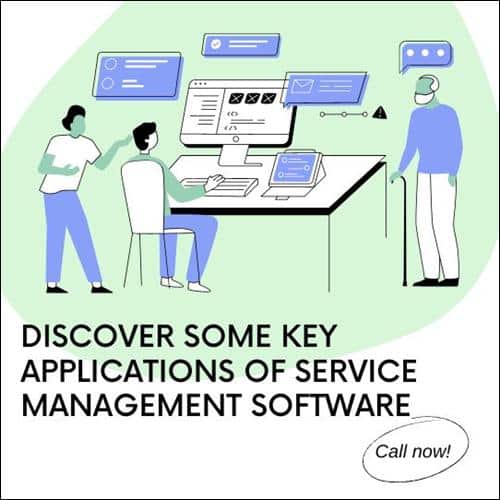
Service management software is designed to streamline and automate various aspects of service delivery, making it a valuable tool for organizations that provide customer service. Here are some typical applications of service management software:
Field Service Management
Service management software can manage field service operations, including scheduling, dispatch, and billing. It can help organizations improve the speed and efficiency of service delivery and reduce costs associated with field service operations.
Ticket Management
Service management software provides a centralized platform to manage and track service requests, incidents, and issues raised by customers. This helps improve the speed and efficiency of service delivery and ensures that all requests are tracked and resolved promptly.
Workforce Management
The software can optimize the allocation of resources and schedules by providing real-time information on the availability of technicians and other service staff. It can also automate the dispatch process, ensuring that the right technician is dispatched to the right job at the right time.
Knowledge Management
The software can provide a centralized repository of knowledge articles and best practices, which service staff can use to resolve customer issues more effectively. It can also help improve service delivery accuracy and consistency by ensuring that all technicians have access to the same information.
Contract and SLA Management
Service management software can help organizations to manage their service level agreements (SLAs) and contracts more effectively. It can provide real-time monitoring of SLA performance and alert users when SLAs are in danger of being breached.
Customer Self-Service
Service management software can provide customers with a self-service portal where they can raise and track service requests, access knowledge articles, and view their asset history. This can help organizations to reduce the volume of incoming service requests and improve customer satisfaction.
Asset Management
The software can provide a centralized database of assets, including equipment, devices, and products, and track their maintenance, repair, and replacement history. This helps organizations manage their assets more effectively and reduce the costs associated with asset ownership.
Reporting and Analytics
Service management software can provide valuable insights into the service department’s performance, including metrics such as ticket volume, resolution time, and customer satisfaction. This information can be used to track areas for improvement and make data-driven decisions.
Mobile Support
Many service management software solutions offer mobile apps that provide technicians with real-time access to information and tools, improving their ability to resolve customer issues on-site.
Project Management
Service management software can manage projects and initiatives, including tracking tasks, deadlines, and budgets. This can help organizations improve project planning and execution and reduce the risks associated with project delivery.
Compliance Management
Service management software can manage compliance with industry standards, regulations, and policies. It can help organizations to monitor compliance, track corrective actions, and demonstrate adherence to regulatory bodies.
Resource Planning
Service management software can help organizations to plan and allocate resources more effectively by providing real-time information on the availability of technicians, vehicles, and equipment.
The bottom line
Organizations can use these applications to improve the speed and efficiency of service delivery, reduce costs, and improve customer satisfaction.
Leave a Reply
You must be logged in to post a comment.